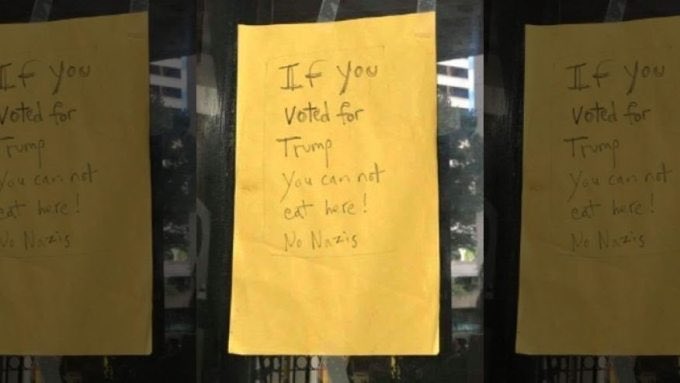There is a Difference Between Political Statements and Religious Convictions
Posted on January 5, 2017 in Public Policy, Religious Freedom by Nathan Cherry
 People should be free to live and do business according to their convictions, even if that means refusing to serve food to Donald Trump supporters.
People should be free to live and do business according to their convictions, even if that means refusing to serve food to Donald Trump supporters.
Our culture increasingly wants to force people to take part in things that offend their convictions and conscience. Like making a baker bake a cake for a same-sex wedding when he only believes in traditional marriage. Or, making a florist create flower art for a wedding she doesn’t believe in.
Some would mistakenly say that forcing people to take part in things that violate their religious beliefs, convictions, or conscience is all part of being “tolerant.” However, that would be a mistaken understanding of the word tolerant. The word tolerant doesn’t mean forcing people to violate their conscience and smile about it. The word tolerant means respecting the divergent views of other people or, in other words, agreeing to disagree.
Take for example the restaurant in Hawaii that declared all Trump supporters are not welcome to eat in their establishment.
A café in Honolulu called Café 8 ½ posted a sign that read: “If you voted for Trump you cannot eat here! No Nazis.”
We can discuss the merits of making such a business decision but, as far as their right to refuse to serve someone they disagree with, that’s another matter. Liberals should, in order to be consistent, condemn this restaurant and force them to serve all people, regardless of their political views. After all, that’s what they want to do to Christians. So, if they are going to force Christians to violate their deeply held religious convictions they must, in order to apply the law evenly and be consistent in their ideology, force this café to serve trump supporters.
Personally, I support the café’s right o determine who they will and will not serve. If the café wants to declare Trump supporters persona non grata, they should have every right to do so. The result? People will speak loud and clear with their money. People that support Trump, or oppose such a business decision, will eat elsewhere. People that oppose Trump or support the business decision will patron the restaurant.
Already people are making their feelings toward this business decision known on review sites like Yelp and social media like Facebook. It appears a majority of people are not happy about the business decision and making their intent never to eat at the restaurant again very clear. The bad reviews have caused the café owners to remove the sign. It seems this was not a deeply held religious or conscience conviction.
However, the baker in Colorado, the florist in Washington, and the photographer in New Mexico have not backed down. They have not, despite government threat fines, and social media backlash, changed their position on why they cannot support same-sex “marriage.” The difference here is one of conviction.
The café owners in Honolulu made a political statement that caused anger, so they relented. The baker, florist, and photographer did not seek to make political statements but only to live and do business according to their religious convictions. The difference between political statements and religious convictions is that one fades over time as new hot-button political issues take precedence while the other remains faithful.
A Christian is willing to sacrifice, to experience loss and hardship in order to remain faithful to his or her convictions. Those convictions don’t come from self, from the media, or from the culture. Convictions come from the Holy Spirit convincing a person of the truth of their position. That transcendent truth cannot be swayed by threat or societal pressure, it is truth that lies beyond anything mankind can control.
Others will make statements, such as the Mormon Tabernacle Choir member that resigned her position so she would not have to sing at Donald Trump’s inauguration. She compared Trump to Hitler and said she couldn’t sing for him. So she resigned. Whether this is a political statement or a statement of religious conviction remains to be seen. But I support her right to make the decision.
And I support the café in Honolulu.
And I support the baker, the florist, and the photographer.
No one should be forced to take part in anything that violates his or her convictions or conscience. People should be free to live and do business according to their beliefs without fear of government reprisal. And tolerance demands that we respect the rights of individuals to act in accordance with their sincerely held convictions.
